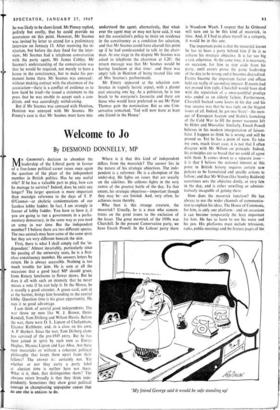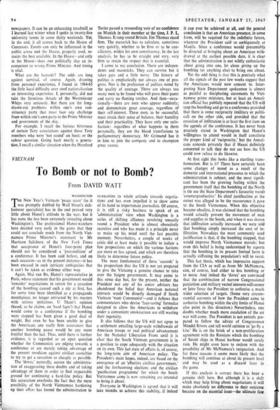Welcome to Jo
By DESMOND DONNELLY, MP
MR 01/mom's decision to abandon the leadership of the Liberal party in favour of a free-lance political career raises once again
the question of the place of the independent member in British politics. Has he any useful role? If he has a valuable part to play, how can he manage to survive? Indeed, does he exist any longer? The larger question is more important than nostalgic reference to the days of T. P. O'Connor—or choleric condemnations of our faceless lobby fodder. In fact, I am strongly in favour of lobby fodder. You have to have it, if you are going to run a government in a parlia- mentary democracy, in the same way as you need an army in war time. But the independent member? I believe there are two different species. The two animals may have some of the same spots but they are very different beneath the skin.
First, there is what I shall simply call the 'in- dependent.' Almost invariably, particularly since the passing of the university seats, he is a first- class constituency member. He answers letters by return. He is always accessible. Nothing is too much trouble for him. He is seen at all the occasions that a good local -MP should grace, from Rotary luncheons to flower shows. But he does it all with such an intensity that he never misses a vote if he can help it. In the House, he is usually a good attender. A green card, sent in at the barrier, brings him bounding to the central lobby. Question time is his great opportunity. He uses it to good advantage.
I can think of several good independents. The war threw up men like W. J. Brown, Denis Kendall, Tom Driberg and Wilson Harris. Before the war, there were D. L. Lipson of Cheltenham, Eleanor Rathbone, and, in a class on his own, A. P. Herbert. Since the war, Tom Driberg alone has survived of the pre-1945 entry. But he has been joined in spirit by such men as Emrys Hughes, Marcus Lipton and Leo Abse. Are these men mavericks or without a coherent political philosophy that keeps them apart from their fellows? The answer is : certainly not. Yet whether or not they carry a party label at election time is neither here nor there. What is it, then, that distinguishes them? The obvious retort broadly is that they think inde- pendently. Sometimes they show great political courage in championing unpopular causes that no one else is anxious to do.
Where is it that this kind of independent differs from the maverick? The answer lies in the nature of his strategic objectives. The inde- pendent is a reformer. He is a champion of the under-dog. He fights on issues that are usually on the sidelines. He seldoms fights in the very centre of the greatest battle of the day. To that extent, his strategic objectives—important though they may be—are limited. And, very often, he achieves more thereby.
Who then is this strange creature, the maverick? Usually, he is a man who concen- trates on the great issues to the exclusion of the lesser. The great maverick of the 1930s was Churchill. In the present Conservative party, we have Enoch Powell. In the Labour party there
'My friend George said it would be safe standing up' is Woodrow Wyatt. I suspect that Jo Grimond will turn out to be this kind of maverick, in time. And, if I had to place myself in a category, it would be in this one.
The important point is that the maverick knows he has to have a party behind him if he is to achieve his strategic objective. It is far too big a task otherwise. At the same time, it is necessary, on occasion, for him to step aside from his party, until events prove the party leadership
of the day to be wrong and it becomes discredited. Events become the important factor and offices held are really of secondary interest. If events had
not proved him right, Churchill would have died with the reputation of a once-youthful prodigy who ended as an elderly failure. Furthermore,
Churchill backed some losers in his day and his true success was that he was right on the biggest
issues of all. Indeed, he got two 'firsts'—the men- ace of European fascism and Stalin's launching of the Cold War to fill the power vacuums left by Hitler and Mussolini. Similarly, Enoch Powell
believes in his modern interpretation of laissez- faire. I happen to think he is wrong and will be
proved so. Yet he has a point of view. To take
my own, much lesser case, it is not that I often disagree with Mr Wilson on principle. Indeed,
his principles are so broad that we could all agree with them. It comes down to a separate issue— it is that I believe the national interest at this
point in British history requires certain new policies to be formulated and specific actions to follow; and that Mr Wilson (like Stanley Baldwin) sometimes sees the objective dimly, or very late in the day, and is either unwilling or adminis- tratively incapable of getting there.
How does the maverick function? He has always to use the wider channels of communica- tion to explain his ideas. The House of Commons, for him, is only one platform—and on occasions it can become temporarily the least important for him. He has to learn to use his voice and his pen. His platforms must include television, radio, public meetings and the feature pages of the
newspapers. It can be an exhausting treadmill as I learned last winter when I spoke in twenty-five university towns in some thirty weekends. Yet, in the end, it all comes back to the House of Commons. Events can only be influenced in the public arena and the House, properly used, re- mains the best available. In the House—and only in the House—does one politically slay an in- competent or wrong Prime Minister. And tilling is vital.
What are the hazards? The odds are long against survival, of course. Again, drawing from personal experience, I found in 1964-65 the little local difficulty over steel nationalisation - an interesting experience. I, personally, did not take the ferocious threats of the Westminster Whips very seriously. But there are the long- drawn-out problems within one's own con- stituency party that must face any challenge from within one's own party to the Prime Minister and government of the day.
For example, I recall the furious bitterness of certain Tory associations against those Tory members who were 'not sound' on Suez; or the colour question. Going back nearly a genera- tion, I recall a similar situation when the Hereford Tories passed a resounding vote of no confidence on Munich in their member at the time, J. P. L Thomas. It rang round Britain. Jim Thomas stood firm. The maverick has to calculate, sometimes very quickly, whether to be firm or to be con- ciliatory, within his own constituency. In the last analysis, he has to be straight and very, very firm to retain the respect that is essential.
I come to my conclusion. There are indepen- dents and mavericks. They can survive but it takes guts and a little nerve. The history of politics is emphatically not always one of pro- gress. Nor is the profession of politics noted by the quality of courage. There are always too many men to be found who will press their pants and carry no flaming torches. And then—occa- sionally—there are men who appear suddenly; and demonstrate great courage, regardless of their self-interest. These men, to be successful, must retain their sense of balance, their humility and their practicality. They have only one satis- faction: regardless of what happens to them personally, they are the blood transfusions to parliamentary democracy. Mr Grimond has it in him to join the company and to champion great causes.



































 Previous page
Previous page